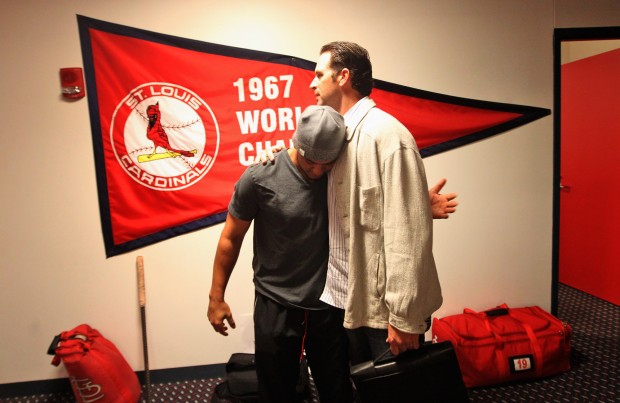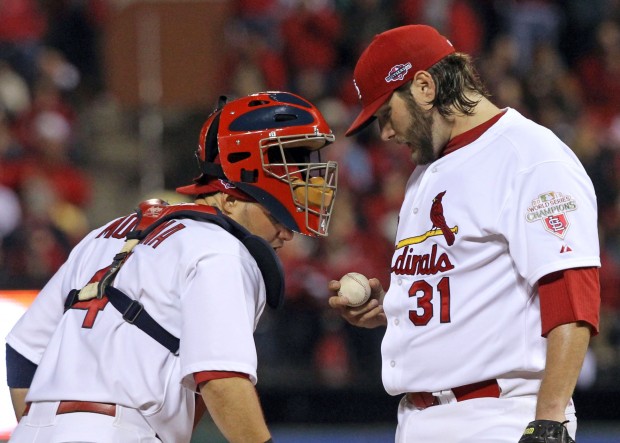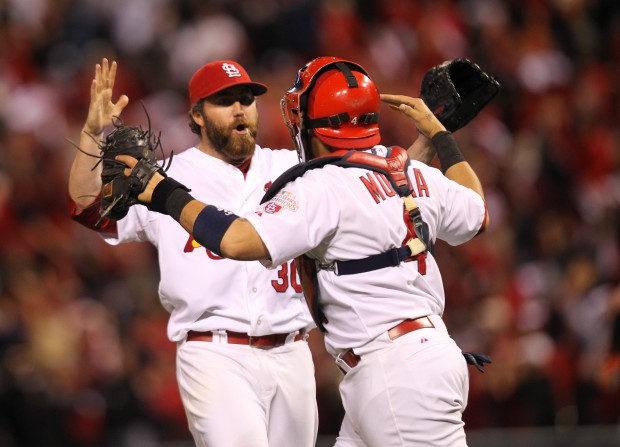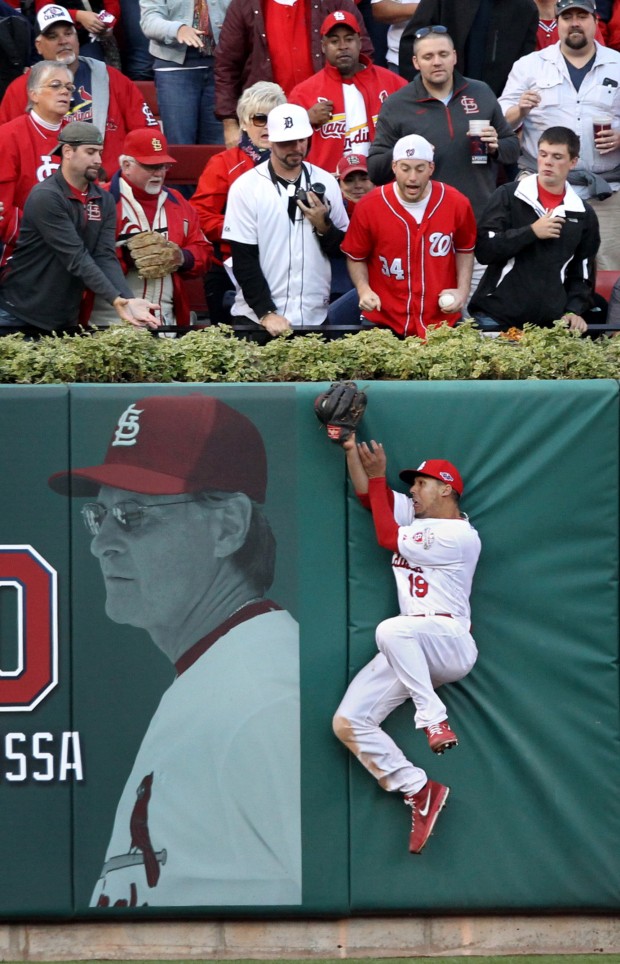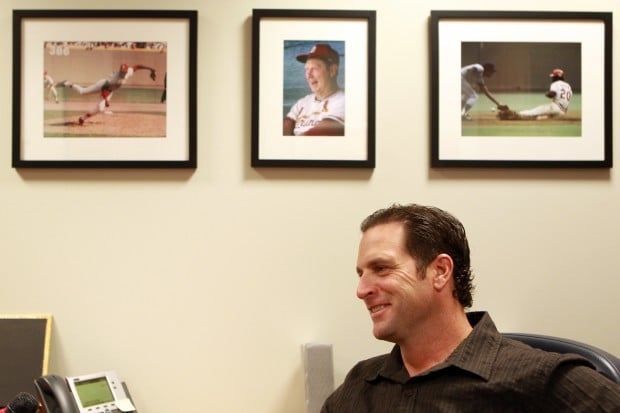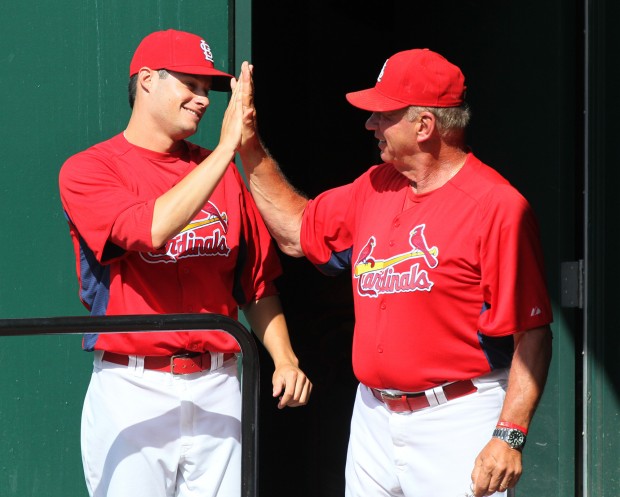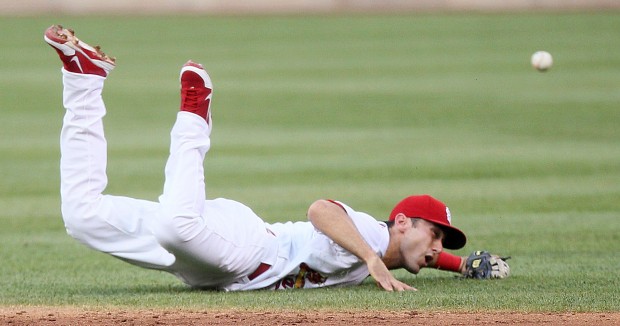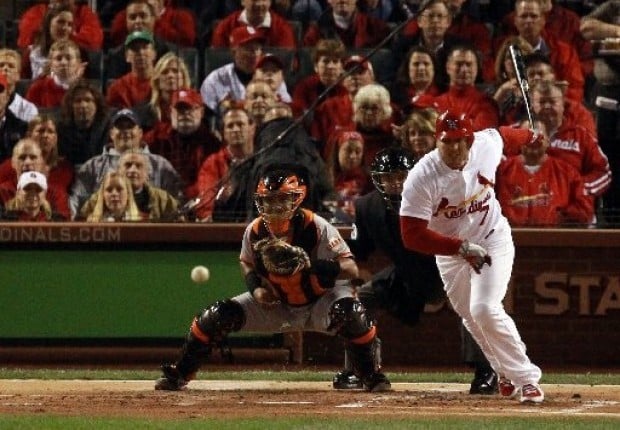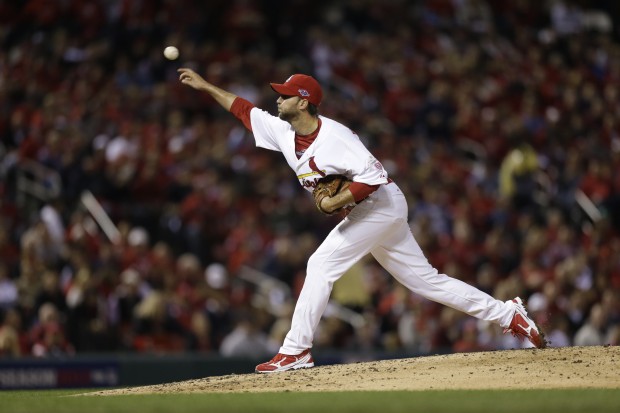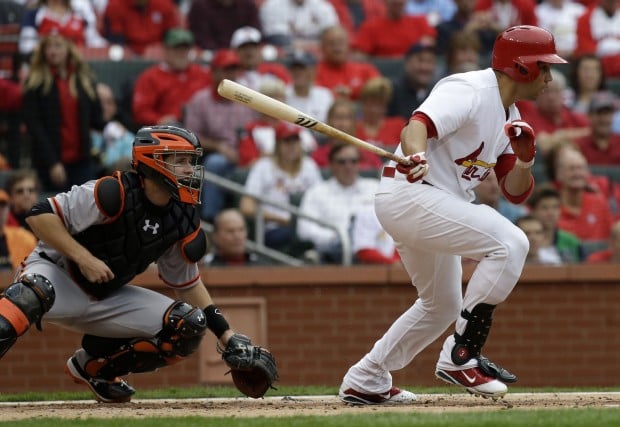Bernie Bytes: Awards for 2012 Cardinals
The 2012 Cardinals had a good season, and they have nothing
to apologize for, and I’ll discuss their year and their future in a
Sunday column.
Today, let’s dish some team awards:
Most Valuable Player: Catcher
Yadier Molina.
This is an easy call. I don’t think I really need to explain the
choice. But in case you missed the season … not only did Molina maintain
his status as the best defensive catcher in baseball, but he emerged as
an offensive force in 2012. He finished fourth in the NL in batting
average (.315), 10th in onbase percentage (.373), 14th in slugging
(.501). He hit 22 homers, 28 doubles, drove in 76 runs and swiped 12
bases. Just a superb all-around season, and don’t forget his leadership
in running the pitching staff. In the
FanGraphs.com rankings of Wins Above Replacement, Molina was 7th in the league with a WAR of 6.5.
The STL Cy Young: Kyle Lohse.
Another easy pick here. Lohse was fifth among NL starting pitchers in
ERA (2.86), tied for fourth in quality starts (24), seventh in innings
pitched (211), and had the top winning percentage (.842) after going
16-3. His win total should have been higher. Lohse was down on the list
(24th) of NL pitchers that received the most run support per start. In
12 combined starts in which he was charged with a loss or had a
non-decision in a game that the Cardinals lost, Lohse had a 3.41 ERA and
eight quality starts.
Rookie of the Year: Matt Carpenter.
He really had a superb season, providing significant value with his
ability to produce offensively, play all of the corner defensive
positions, and serve as a highly effective starter when needed.
Carpenter helped lessen the damage of the Cardinals’ many injuries by
hitting .308 with a .382 onbase percentage and .490 slugging pct. in 66
games as a starter. He also had 11 RBIs as a pinch hitter. He batted
.311 with runners in scoring position, and .333 with RISP and two out,
and .303 in high-leverage situations.
Breakout season: The choice is Allen Craig.
Yes, Craig emerged as a true impact bat in 2011, but that was as a
part-time player. This season he went national in that he had enough
plate appearances to qualify for the league’s leader boards on offense.
Craig finished sixth in the NL in batting average (.307), led the majors
in average with runners in scoring position (.400), was fifth in
slugging percentage (.522). Most of all, he drove in runs. Despite
playing in only 119 games and taking only 469 at-bats due to injuries,
Craig finished tied for fifth in the NL in RBIs with 92. But here’s the
true measure of Craig’s timely production: he led the NL in RBI rate,
delivering an RBI every 5.1 at-bats.
Most underrated pitcher: that would be the closer,
Jason Motte.
He was tied with Atlanta’s Craig Kimbrel for the league lead with 42
saves. After some rough moments in the first two months, Motte found a
consistent groove in the middle of June. From June 13 until the end of
the regular season, he had 41 saves in 45 opportunities, an ERA of 2.18
and averaged 12 strikeouts per nine innings. So why do I believe Motte
is underrated? Because closers usually are ripped by fans when they blow
saves, and there is a tendency to overlook the quality and consistency
of their work.
Most underrated hitter: Matt Holliday.
Many of you will disagree with that. I would guess that many of you
would go the opposite way and claim that Holliday is most overrated …
which is EXACTLY why strongly believe he’s underrated. In my 27 years
I’ve never observed a prominent St. Louis athlete that’s been as
unfairly maligned by fans as Holliday. Why is that? We’re an old-school
baseball town, and a nostalgic baseball town. Holliday got a $120
million contract from the Cardinals and way too many fans are hung up on
that, forgetting that (1) this isn’t 1952, and (2) Holliday provides
good value for the dollar.
Most overrated hitter:
center fielder Jon Jay. I think Jay is good. I think he had a good
season. He was impressive in his defensive range in CF. I respect him.
But I would also be a coward if I declined to choose someone for the
overrated category. My reason for Jay? A .210 batting average, .274
onbase percentage and .275 slugging percentage on the road. That’s
really a minus for a leadoff hitter. Jay played well in center, he had a
plus five rating in the John Dewan Fielding Bible system. But that plus
five didn’t place him among the plus-minus leaders in CF. Atlanta’s
Michael Bourn was a plus 37. I like what Jay did for the 2012 Cardinals.
He deserves credit for snatching the job from Colby Rasmus, and then
holding onto it and making the best of it. I’m just hung up on the
home/road splits.
Most overrated pitcher: this
one is tough; Adam Wainwright would be the choice of many because he
wasn’t in vintage form and had some rough days. Which us understandable;
he missed all of 2011 (elbow surgery.) Jake Westbrook is a candidate.
But the choice here _ and really I am not trying to be controversial _
is Lance Lynn. Why? Overall he did a nice job for the Cardinals. A very
nice job, going 18-7 with a 3.78 ERA. But did Lynn really deserve to be
an NL All-Star? Probably not. Other NL pitchers were having better
seasons at the time, and that includes Lohse. But more than that, Lynn
had a 4.78 ERA over his final 16 starts and was demoted to the bullpen. A
lot of people will point to his wins and say, “How the heck can that be
considered overrated?” One answer: Lynn had the most generous run
support of any NL starter in 2012. I like Lynn’s future prospects. He’s
talented. And the Cardinals want him to focus on conditioning this
offseason. That will help him.
If you prefer the standard stats,
Holliday finished seventh in the NL in RBIs, seventh in onbase
percentage, seventh in runs, 17th in slugginng, eighth in combined
onbase+slugging, 10th in extra-base hits, 15th in batting average, 14th
in homers, fifth in most times on base. People obsess over his batting
average with runners in scoring position, but batting average in
high-leverage situations is a more credible stat. In high-leverage plate
appearances Holliday batted .276 with a .376 OBP and .495 SLG.
In
the sabermetric evaluations used by front offices, this season Holliday
was 14th in the NL in WAR (5.1). In Holliday’s three full seasons with
the team his WAR is 16.7, and over that span only Joey Votto, Ryan Braun
and Andrew McCutchen have been more valuable among NL players.
According to FanGraphs, Holliday played at a $26 million value in 2010, a
$22.5 million value in 2011, and a $23 million value in 2012.
Best newcomer: Carlos Beltran.
Yes, his extended drought after the All-Star break was problematic and
disturbing. And it knocked down his season numbers to a .269 batting
average, .346 OBP and .495 SLG. But Beltran reheated in September and
played an important role in getting the Cardinals to the postseason.
Here’s the bottom line: Beltran played in more games and had more
at-bats (547) than we than we expected (151). He hit 32 homers and drove
in 97 runs. He was a starting NL All-Star. I don’t know about you, but
that was more than I thought he would do.
Coach of the Year: Derek Lilliquist.
He did an excellent job taking over as pitching coach for Dave Duncan.
He maintained the high standards, and the performance, and did so
despite considerable injury-related turmoil within the rotation.

